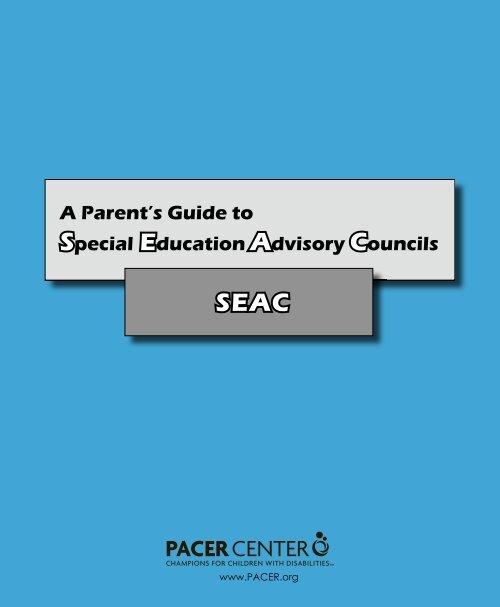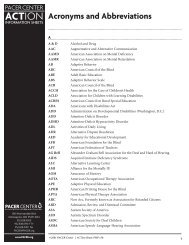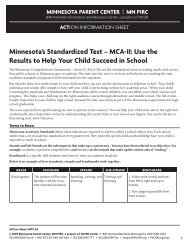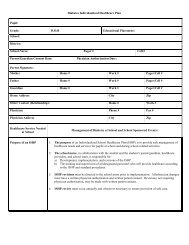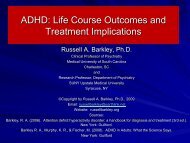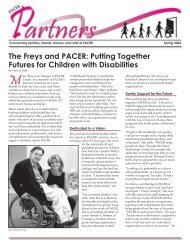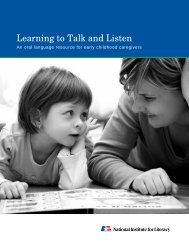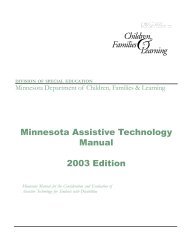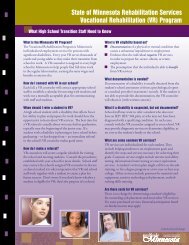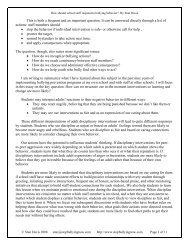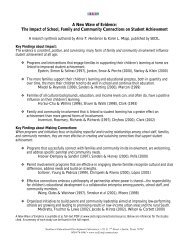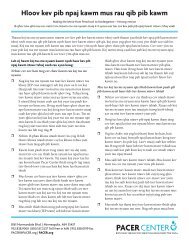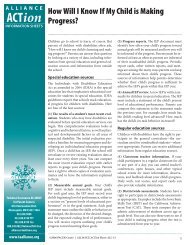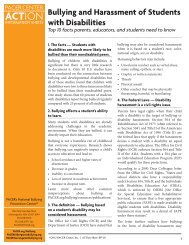SEAC Booklet.indd - PACER Center
SEAC Booklet.indd - PACER Center
SEAC Booklet.indd - PACER Center
You also want an ePaper? Increase the reach of your titles
YUMPU automatically turns print PDFs into web optimized ePapers that Google loves.
A Parent’s Guide to<br />
Special Education Advisory Councils<br />
<strong>SEAC</strong><br />
www.<strong>PACER</strong>.org
A Parent’s Guide to<br />
Special Education Advisory Councils<br />
<strong>SEAC</strong><br />
Paula F. Goldberg, <strong>PACER</strong> <strong>Center</strong> Executive Director<br />
Written by Carolyn Anderson, Parent Training Advocate<br />
www.<strong>PACER</strong>.org
© 2006, 2005 by <strong>PACER</strong> <strong>Center</strong>, Inc. All rights reserved. No portion<br />
of this book may be reproduced, stored in a retrieval system, or<br />
transmitted in any form or by any means, electronic, mechanical<br />
photocopying, recording, or otherwise without express written<br />
permission of <strong>PACER</strong> <strong>Center</strong>, except for brief quotations or critical<br />
reviews.<br />
Special thanks to the Minnesota Department of Education for funding<br />
this project.<br />
<strong>PACER</strong> <strong>Center</strong><br />
8161 Normandale Blvd.<br />
Bloomington, MN 55437-1044<br />
952-838-9000 (voice)<br />
952-838-0190 (TTY)<br />
800-537-2237 (toll-free in Greater Minnesota)<br />
952-838-0199 (fax)<br />
E-mail: <strong>PACER</strong>@<strong>PACER</strong>.org<br />
Web: www.<strong>PACER</strong>.org
Introduction<br />
Minnesota parents of children who are in special education<br />
may participate on special education advisory councils (<strong>SEAC</strong>s)<br />
in their local school districts. This booklet describes what these<br />
groups are, how they operate, and how parents can contribute<br />
effectively to their local council.<br />
WHAT IS A <strong>SEAC</strong>?<br />
A <strong>SEAC</strong> (pronounced “seek”) is a group that provides input<br />
on special education issues to its local school district. Its purpose<br />
is to advise and advocate, not to decide policy. Minnesota law<br />
requires each school district in the state to have a <strong>SEAC</strong>, although<br />
it does not specify how the groups should be organized or what<br />
duties they should perform. As a result, each <strong>SEAC</strong> may have a<br />
unique mission and structure. (See “What the Law Says” on page 5.)<br />
1
WHY ARE <strong>SEAC</strong>S IMPORTANT?<br />
Local <strong>SEAC</strong>s advise school districts on the development of<br />
programs and services to meet the special educational needs of<br />
children and families. By sharing their unique perspective of what<br />
it is like to use these services, parents can help the district to be<br />
more effective. As a result, outcomes for children with disabilities<br />
should improve.<br />
WHY MIGHT I WANT TO PARTICIPATE ON A <strong>SEAC</strong>?<br />
Parents give many reasons for joining a <strong>SEAC</strong>, including<br />
these:<br />
• I may be able to help other families and children with<br />
disabilities in my school district.<br />
• I can share what I’ve learned since my child began his<br />
education.<br />
• I can support the school professionals in my district.<br />
• I will be a good role model for my child.<br />
• I feel good when I make a contribution to this<br />
community.<br />
• I will learn information and skills that may help me work<br />
more effectively with my school district.<br />
• I will meet others with similar goals, both parents and<br />
school professionals.<br />
• I may build positive relationships with others in my<br />
district.<br />
• I will become more knowledgeable about special<br />
education.<br />
• By sharing my unique perspective and insights as a parent,<br />
I may help the school district work more effectively with<br />
families and improve outcomes for children.<br />
2
What the Law Says<br />
Minnesota law requires each school district in the state to<br />
have a special education advisory council (<strong>SEAC</strong>). Here is<br />
what the statute says:<br />
125A.24 PARENT ADVISORY COUNCILS.<br />
In order to increase the involvement of parents of children<br />
with disabilities in district policy making and decision<br />
making, school districts must have a special education<br />
advisory council that is incorporated into the district’s<br />
special education system plan.<br />
(1) This advisory council may be established either<br />
for individual districts or in cooperation with other<br />
districts who are members of the same special<br />
education cooperative.<br />
(2) A district may set up this council as a subgroup of<br />
an existing board, council, or committee.<br />
(3) At least half of the designated council members<br />
must be parents of students with a disability.<br />
When a nonpublic school is located in the district, the<br />
council must include at least one member who is a parent<br />
of a nonpublic school student with a disability, or an<br />
employee of a nonpublic school if no parent of a nonpublic<br />
school student with a disability is available to serve.<br />
Each local council must meet no less than once each year.<br />
The number of members, frequency of meetings, and<br />
operational procedures are to be locally determined.<br />
Rest of bill can be found at: http://www.revisor.leg.<br />
state.mn.us/bin/bldbill.php?bill=H0141.1&session_<br />
year=2005&session_number=1<br />
3
HOW DO I FIND MY LOCAL <strong>SEAC</strong>?<br />
Call your school district’s special education director and ask<br />
when and where the group meets next. If you are not sure how to<br />
reach your district, call <strong>PACER</strong> <strong>Center</strong>.<br />
HOW DO I JOIN MY LOCAL <strong>SEAC</strong>?<br />
Each school district determines <strong>SEAC</strong> membership differently.<br />
Some <strong>SEAC</strong>s ask for applicants and appoint members; others use<br />
volunteer members. Your district’s special education director can<br />
explain how your <strong>SEAC</strong> works.<br />
Before you join a <strong>SEAC</strong>, you may want to attend a meeting to<br />
learn more about the group. Meetings are open to the public. You<br />
may want to ask or observe:<br />
• What is the written mission of this <strong>SEAC</strong>?<br />
• Are there any bylaws? May I see them?<br />
• How often does the <strong>SEAC</strong> meet? When? Where?<br />
• How does one become a member?<br />
• How long does a member serve?<br />
• Whom does the council advise? How often? What is done<br />
with the advice?<br />
• Who runs or chairs the meeting?<br />
• Who sets the agenda?<br />
• Is there an orientation for new members?<br />
• Do additional committees or work groups meet outside<br />
of the regular meeting times?<br />
• Who serves on this council besides parents?<br />
• Are there annual reports or past meeting minutes I could<br />
read?<br />
• Whom could I contact for more information?<br />
4
You also may want to ask yourself these questions before<br />
joining a <strong>SEAC</strong>:<br />
• Am I able to set aside the needs of my own child and<br />
look at the “big picture” in my district? Would my<br />
feelings (such as anger or anxiety or sadness) make me<br />
less effective than I’d want to be? Can I set aside my own<br />
emotional issues?<br />
• Is it a good use of my skills and time?<br />
• What talents or strengths could I bring to this group?<br />
• Can I commit the necessary time?<br />
• Could my participation make a difference for children<br />
and families?<br />
HOW DO I FIND MY ROLE ON THE <strong>SEAC</strong>?<br />
Once you’ve joined your local <strong>SEAC</strong>, it will take time and<br />
patience to become a truly effective participant. These techniques<br />
can help you find your unique place in the group.<br />
• Ask yourself if you feel welcome there. If not, what can<br />
you do to improve the situation?<br />
• Be willing to listen at first. Learn about the people, the<br />
issues, the programs, and background information before<br />
offering advice or opinions.<br />
• Be willing to say, “I don’t know yet” or “I need more<br />
information in order to comment about that issue.”<br />
• Ask questions about anything you don’t understand. If<br />
acronyms are used, ask if there is a list of acronyms and<br />
definitions to which you could refer. Ask where you<br />
could find information covered at a previous meeting.<br />
• Think about your personal skills and how they might<br />
best be used. Are you a writer, speaker, computer expert,<br />
5
or technology professional? Are you politically savvy?<br />
Are you well organized, perceptive, verbal, and caring?<br />
<strong>SEAC</strong>s can make use of all of these skills.<br />
• Learn all you can about your school district’s structure,<br />
policy, and administration.<br />
• Do your homework. Read materials provided to<br />
participants.<br />
• Come prepared to contribute.<br />
• Develop an understanding of the “big picture” issues<br />
facing the district, beyond those of your own child and<br />
family.<br />
HOW CAN I HELP MY <strong>SEAC</strong> TO BE EFFECTIVE?<br />
You can help your <strong>SEAC</strong> be effective, useful, and valuable to<br />
the school district in several ways:<br />
• Encourage the group to look at its mission statement (if<br />
one exists) and answer these questions: Does it provide<br />
direction for the group? Is it clear? Is there a need to<br />
write or rewrite a mission statement?<br />
• Help clarify expectations. Do members expect only<br />
to give advice, or do some also expect the advice to<br />
be followed? How do members feel about this? Do<br />
expectations need to be examined or made more clear?<br />
• Be sure members treat each other respectfully. Do<br />
parents listen to each other’s unique perception and<br />
experience?<br />
• Distinguish between long- and short-term goals. Does<br />
this distinction need to be defined and made more clear?<br />
• Discuss how conflict is handled. Does the group look<br />
for consensus and solutions? Are different viewpoints<br />
valued?<br />
6
• Help the group find the information it needs to make<br />
decisions.<br />
• Suggest that the group adopt communication ground<br />
rules.<br />
• Encourage diversity by including parents with the<br />
cultures, languages, and disabilities represented in your<br />
district.<br />
• Be sure that meetings are run in a timely, organized way.<br />
Making and following an agenda is effective.<br />
• Support productive decision making. Are conclusions<br />
reached by consensus, or do discussions continue with<br />
no resolution or closure?<br />
Missions and Goals<br />
<strong>SEAC</strong>s that have a clear mission and goals tend to be<br />
productive and effective. Here are some examples of mission and<br />
goal statements from Minnesota <strong>SEAC</strong>s:<br />
• Support, advocate, and advise on special education<br />
matters.<br />
• To act as an advisory body to the district through the<br />
director of special education on behalf of students<br />
receiving special education services. <strong>SEAC</strong> will work<br />
toward the district mission to instill in each learner a<br />
passion for learning and a commitment to reach one’s<br />
potential throughout life.<br />
• We exist to advise the school district on matters relating<br />
to continuous program improvement efforts as they<br />
pertain to special education. We provide communitywide<br />
support to families with students from birth<br />
7
through grade 12 in the school district’s special education<br />
programs.<br />
• Provide input into the decision making process of the<br />
special education department. Provide a communication<br />
link with the community at large. Advocate for highquality<br />
educational programs for all learners. Assure<br />
the implementation of the district and special education<br />
mission to all students in the district.<br />
• To advise the district on the education of children with<br />
disabilities. The essence of the council’s purpose is to<br />
provide parents of children with disabilities input into<br />
the district regarding policies, practices, and issues<br />
related to the education of children and youth with<br />
disabilities.<br />
• Advise the director on special education–related issues<br />
and engage in at least one substantial project each year to<br />
benefit students with disabilities.<br />
• The long-term goal is to advocate for high quality<br />
programs and services necessary to effectively and<br />
efficiently meet the needs of all children with disabilities<br />
and their families. Each year the council also establishes a<br />
short-term goal.<br />
• To seek advice from parents on district practice and<br />
policy relating to special education and to involve<br />
parents in decision making.<br />
• To act as an advisory body to the district on behalf<br />
of students receiving special education services. The<br />
purpose of the <strong>SEAC</strong> is to improve the educational<br />
opportunities for students with disabilities working as<br />
partners in a collaborative relationship.<br />
• To provide a forum for parents and staff to share ideas,<br />
identify concerns, and advise the district in order to<br />
improve services for children with disabilities.<br />
8
DEALING WITH CONFLICT<br />
<strong>SEAC</strong> members come from a variety of backgrounds and<br />
perspectives. As a result, differences of opinion will inevitably<br />
arise. Through flexibility and compromise, your group can<br />
resolve its conflicts, reach consensus, strengthen relationships,<br />
and accomplish goals.<br />
Here are some questions you and the other members may want to<br />
ask yourselves as you deal with differences of opinion:<br />
• Am I contributing to the conflict or to a resolution?<br />
• Are we being respectful to each other?<br />
• Have we defined the problem before starting to propose<br />
solutions? (We may be disagreeing because we aren’t<br />
solving the same “problem.”)<br />
• Are we staying within our mission or goal statement?<br />
• Could I meet privately with the special education<br />
director about a particular <strong>SEAC</strong> issue?<br />
• Are we talking about individual children or looking at<br />
services for all of them?<br />
• Would it help if we brainstormed solutions, with no<br />
interruptions or evaluations until the list is complete?<br />
Conclusion<br />
Minnesota legislators realized the value of parent involvement<br />
in school district decision- and policy-making by requiring<br />
<strong>SEAC</strong>s. <strong>PACER</strong> offers these answers, tips, and suggestions to<br />
support parents as they participate on local special education<br />
advisory councils. <strong>SEAC</strong>s can be an effective way for parents and<br />
school professionals to work together for the benefit of children<br />
with disabilities.<br />
9
<strong>SEAC</strong> Resources<br />
VISIT <strong>PACER</strong> CENTER AT WWW.MN<strong>SEAC</strong>INFO.ORG FOR:<br />
• Keys to Success in the Special Education Advisory Council<br />
(<strong>SEAC</strong>) Parent-School Partnership<br />
• Increasing Parent Involvement on Special Education<br />
Committees, Councils, and Boards<br />
• Disability-related Interagency, Special Education Council, and<br />
Committee Opportunities<br />
• IEP (Individual Effectiveness Plan) for Parent Members of<br />
Local Special Education Advisory Councils (<strong>SEAC</strong>)<br />
• Key Questions for Special Education Advisory Council (<strong>SEAC</strong>)<br />
Parent Members to Ask<br />
• Know Your School District: Tips for Parent Members of Local<br />
Special Education Advisory Councils (<strong>SEAC</strong>)<br />
VISIT HTTP://NICHCY.ORG FOR:<br />
• Serving on Boards and Committees, National Dissemination <strong>Center</strong><br />
for Children with Disabilities, 1998.<br />
VISIT WWW.FAMILYCENTEREDCARE.ORG FOR:<br />
• Words of Advice: A Guidebook for Families Serving as Advisors,<br />
Thomas, Josie, and Jeppson, Elizabeth, Bethesda, MD: Institute<br />
for Family-<strong>Center</strong>ed Care, 1997.<br />
VISIT WWW.EDUCATION.STATE.MN.US FOR:<br />
• Special Education Advisory Panel (SEAP) Manual, Minnesota<br />
Technical Assistance for Family Support and Minnesota<br />
Department of Children, Families & Learning, 2003.<br />
10
www.<strong>PACER</strong>.org


